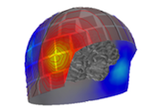mne.io.read_raw_gdf¶
- mne.io.read_raw_gdf(input_fname, eog=None, misc=None, stim_channel='auto', exclude=(), preload=False, verbose=None)[source]¶
Reader function for GDF files.
- Parameters
- input_fname
str Path to the GDF file.
- eog
listortuple Names of channels or list of indices that should be designated EOG channels. Values should correspond to the electrodes in the file. Default is None.
- misc
listortuple Names of channels or list of indices that should be designated MISC channels. Values should correspond to the electrodes in the file. Default is None.
- stim_channel‘auto’ |
str|listofstr|int|listofint Defaults to ‘auto’, which means that channels named ‘status’ or ‘trigger’ (case insensitive) are set to STIM. If str (or list of str), all channels matching the name(s) are set to STIM. If int (or list of ints), channels corresponding to the indices are set to STIM.
- exclude
listofstr Channel names to exclude. This can help when reading data with different sampling rates to avoid unnecessary resampling.
- preloadbool or
str(defaultFalse) Preload data into memory for data manipulation and faster indexing. If True, the data will be preloaded into memory (fast, requires large amount of memory). If preload is a string, preload is the file name of a memory-mapped file which is used to store the data on the hard drive (slower, requires less memory).
- verbosebool,
str,int, orNone If not None, override default verbose level (see
mne.verbose()and Logging documentation for more). If used, it should be passed as a keyword-argument only.
- input_fname
- Returns
- rawinstance of RawGDF
The raw instance.
See also
mne.io.read_raw_edfReader function for EDF and EDF+ files.
mne.io.read_raw_bdfReader function for BDF files.
Notes
If channels named ‘status’ or ‘trigger’ are present, they are considered as STIM channels by default. Use func:
mne.find_eventsto parse events encoded in such analog stim channels.
